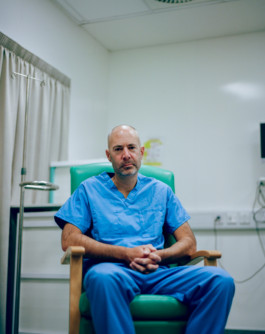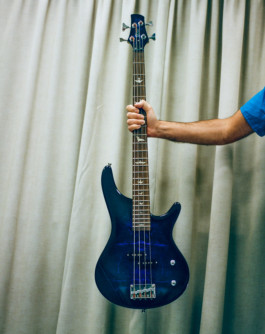Brendan: “Giving a person their voice back is like giving them their personality back”


listen:
Photography: Myah Jeffers
Audio Producer: Sara Conkey
read:
It’s purple. It’s got little doves set into it. And it really catches the light.
I bought a bass from the internet, because I thought it looked really cool. And so that’s my favourite looking guitar, although I can’t play it very well.
So I think it looks cool, but I don’t make it sound cool.
So every day during lockdown I tried to find some time to sit down and play something on the guitar. And that would usually draw one or more of the kids along to see if they could join in. And it became a daily thing where we’d all try and get together and play a song or two.
And that was a really nice time, even if just for 10 minutes just to thrash out some loud rock music. It was a good stress-buster.
During the pandemic, I saw my home life as a place of refuge. It was a safe place, and it felt good to be at home.
My name is Brendan McGrath. I’m an Anaesthetic Consultant.
When the pandemic struck, all of my research and non-clinical activities were stopped. And I was transferred into full time work on the intensive care unit to manage all the Covid patients.
I had an idea in January that Covid was going to be a problem. And I think by February we realised it was going to be big. In Manchester we were two or three weeks behind the pandemic. When I looked at what was happening in London, I thought: ‘Oh my god’.
So during the pandemic, my days fell into a fairly typical pattern. The shifts were typically 12 hours, but they always started before eight o’clock. And they always finished after eight o’clock. So there was probably about three months where it was full-on. And I think it passed in a bit of a blur. It was a bit like Groundhog Day where you’d go into hospital, and we were counting up how many patients had been admitted overnight, and then making plans for where we were going to put everyone and who was going to look after them.
I’ve never worked in a war zone or a field hospital or anything like that. But it felt like it was a relentless, constant barrage of new admissions who were really sick who needed a lot of care. Most people who were admitted to an intensive care unit with Covid ended up on a ventilator. That means you’re given drugs to sedate you, and you’re placed into a coma. And a breathing tube is inserted either into your mouth or into the front of your neck. And you’re attached to a ventilator which takes over your breathing. My job is essentially to monitor them. Some elements of my day job were definitely easier during the pandemic, because everyone had the same problem. Everyone had the same disease, and the treatment was essentially the same. So when my alarm went off around twenty past six in the morning, the first thing I thought was ‘Same again’. And I’d get on my bike, and I’d cycle to work, and we’d do the same thing again.
Part of the attraction of working in intensive care is it’s a high-octane environment. The intensity was made a lot worse by the PPE that we had to wear. Which necessarily consisted of a tight fitting facemask - masks that would usually be used in industry that were clamped to your face for two or three hours at a time while you were wearing visors, headgear, and two or three layers of protective clothing, which meant the environment was hot. It was difficult to hear, it was difficult to talk to your colleagues, difficult to talk to patients, and it was pretty stressful. You could see the marks on people’s faces from the face masks. Some of our staff had to have time off work to let their noses and their faces recover from the pressure sores from the masks. In the coffee room, sometimes there wasn’t much conversation; people were just mentally drained from what they’d just done.
When a patient has been on a ventilator for a number of weeks, often what I have to do is insert a tracheostomy, which is a temporary tube in the front of the neck which allows us to continue to give help from the ventilator, but the patient can be a lot more awake and sometimes wide awake. Unfortunately, though, with a tracheostomy, it means that you can’t speak because no air flows through your nose and your mouth. We could see them awake, desperate to communicate, desperate to talk to their families, desperate to talk to us. And so we spent a lot of time and effort trying to implement strategies to get people talking. I’ve been working on different ways of introducing a new gas flow to the back of your throat, which sounds a bit weird, but actually can get patients to speak, who are still attached to a ventilator. What Covid did was it accelerated our mission to try and make this a mainstream therapy. And we’ve rolled it out through the English NHS, but also spread it around the world.
We can get patients talking days or even weeks earlier than they would have done. And when a patient speaks for the first time, when they’ve been trying to communicate with you, it’s quite amazing. Giving a person their voice back is like giving them their personality back. They go from being ‘the chap in bed six with Covid’ to Dave, from Manchester, who’s moved here from Glasgow, who’s got a Scottish accent, who’s moved down to look after his grandkids. You can have a conversation, you can learn about them, you can see the way they interact with their family. And they can tell us stories. And they go from being a patient to a person. And sometimes the medical nursing and other staff around the bedside would be in tears, hearing a patient tell you how thankful they were for the care they’d received, or watching that first conversation with a relative. And they’d say, ‘I’m alright. I love you. See you soon’. Everyone was in bits.
So I think along with a lot of my colleagues, I’ve learned a lot about myself during the pandemic. I always thought that I could rise to a challenge and rise to an occasion. But now I know I can. I think in the middle of the pandemic I didn’t find it too hard to keep going. And I think now things are starting to die down – I feel a little bit broken by what’s happened. And it has taken its toll.
I’m exhausted.
But I’m worried about winter. And I’m worried about what’s going to happen if the Covid cases start to pick up again, and how we’re going to manage. I think the most worrying thing is the uncertainty in that I don’t know quite how it’s gonna turn out.
We just don’t know what’s coming.
An Empathy Museum project made with the support of NHS England and NHS Improvement, The Health Foundation, and Arts Council England